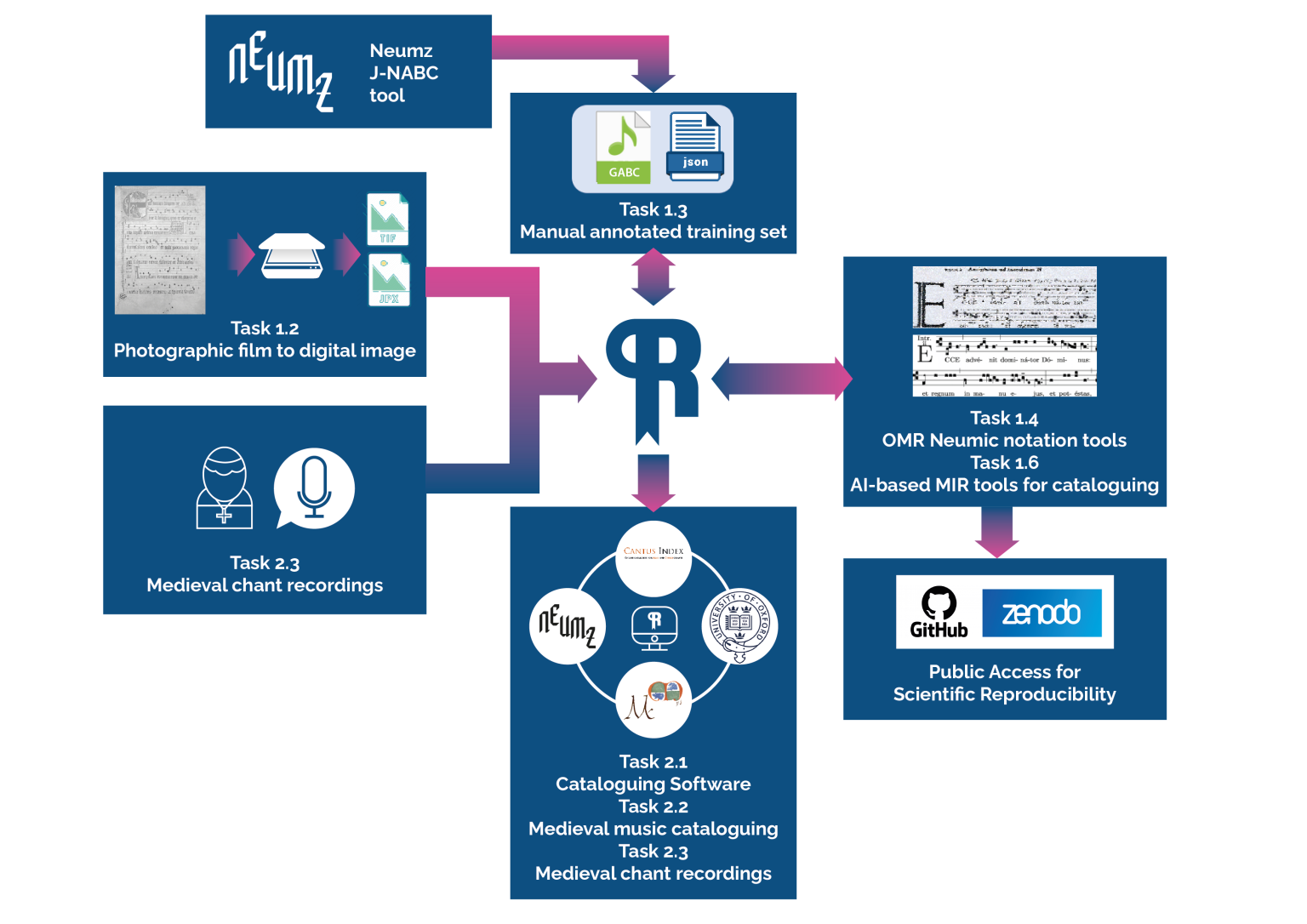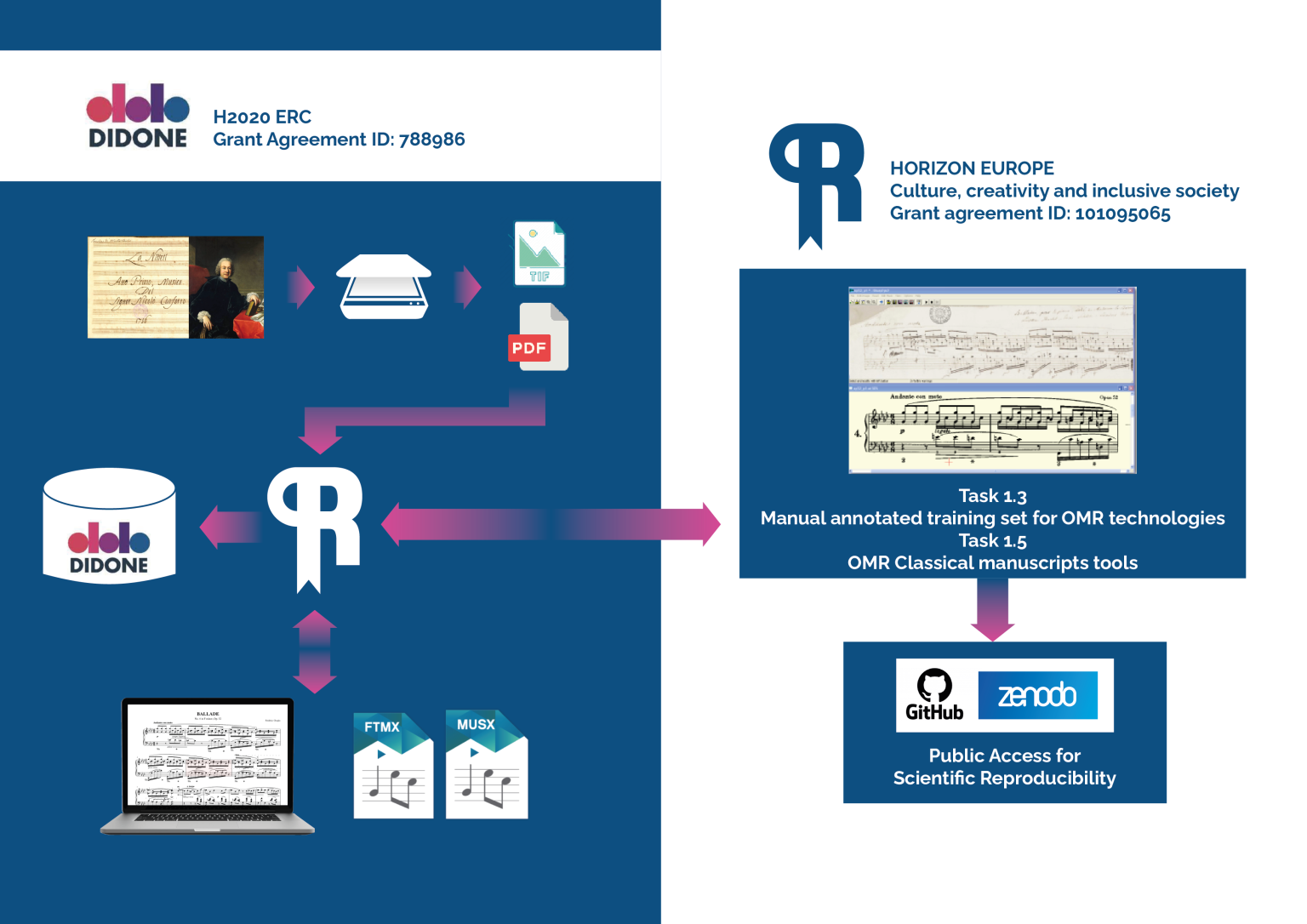Repertorium is dedicated to preserving and researching all European Classical music but concentrates on two main areas: medieval Gregorian Chant and Baroque and Classical Opera.
Gregorian Chant
European classical music developed out of mediaeval plainchant written for the Roman Rite, promulgated across Europe to unify the continent politically under a single liturgy.
Baroque & Classical Opera
The DIDONE database is a corpus of 3,000 digitised arias from 200 18th-century baroque and classical operas written on texts by the poet and librettist Pietro Metastasio.
Preserving and Digitizing Plainchant
A large portion of the project is dedicated to the preservation and diffusion of plainchant, which, while an essential and worthwhile end in its own right, will meanwhile nourish the project with thousands of hours of audio recordings and millions of notated musical pieces upon which to train its AI systems, accomplishing two complimentary valuable goals for the cost of one.
European musical tradition was fundamentally shaped by the development of liturgical plainchant, from which the first accessible examples of polyphony eventually developed. Many local musical traditions, formal styles, notational systems, and compositional systems evolved from this repertory. The digitisation of this tradition’s performance practice is crucial to its preservation.
- 400,000 photographs of ancient manuscripts from the Paleographic Workshop of the Abbey of Solesmes will be digitised based on the internationally recognized standards set by CNRS.
- These will be made publically accessible via Oxford’s website DIAMM (Digital Image Archive of Mediaeval Music). The images will be accessible to other databases through the IIIF framework. An enhanced IIIF viewer will be built by the project allowing users to view the image in original negative and inverted positive colours.
- There are multiple musical works within each of the 400,000 manuscript pages: it is estimated that 2 million chants will be indexed and cross-correlated among the collection. All will be automatically indexed pending human verification to enhance archive usability.
- 127.000 chants will be manually catalogued, and thousands transcribed to train the optical music recognition and music information retrieval neural networks. The indexes will be publicly available through DIAMM, MMMO, and Cantus Index.
- During this process, 4,000 “novel” chants are expected to be recovered, i.e., chants that have not been studied, catalogued, or sung for over 1,000 years.
- A concert by Schola Antiqua will be held featuring the first modern performance of these novel chants
- Approximately 2,200 hours of Gregorian chant will be recorded at the Abbaye Sainte-Madeleine (France), where monks celebrate the pre-Vatican II liturgical form known as the Tridentine Rite. These melodies and texts match what is found in the Solesmes archive. The recordings will train the AI to follow the score while “listening”. These recordings will also be publicly available on the specialised Gregorian app Neumz.
- All 2 million chants will be automatically transcribed using Optical Music Recognition to render the database searchable.
- DIAMM, MMMO, and Cantus Index will be interconnected via API to avoid duplication, ensure consistency and facilitate consultation. This “linked-data model” API will be publicly available to other archives.
- ODRATEK built a real-time javascript NABC transcription tool called Scrib.io for the project to facilitate the OMR training process and has made it freely available online for others to use.

Classical Opera
Digitising 18th-century baroque and classical opera manuscripts from the DIDONE database.
DIDONE
ERC Didone project has created a corpus of 3,000 digitised arias from 200 opera scores based on the librettist Metastasio’s eight most popular dramas. Arias are solo vocal works sung without chorus but with orchestral accompaniment during an opera. The comparative scrutiny of dozens of different musical settings of the same librettos reveals how composers correlate specific dramatic circumstances and emotions with distinct poetic and musical features. The results apply to three main fields: (i) opera performance; (ii) analysis and interpretation of other types of music; and (iii) composition in several scenarios, from film soundtracks to creation by Artificial Intelligence.
- Optical music recognition technology will be trained and applied to the musical transcription of 18th-century baroque and classical opera manuscripts from the Didone database. This database is composed of manuscripts and manual transcriptions of 3,000 arias.
- Unlike current OMR systems valid only for printed music, this technology will robustly perform upon a variety of handwritten sources by different authors or suffering degradation.
- This tool will allow polyphonic scores with multiple staves. Inevitably, the output of the algorithm will require some manual revision and fixing, but human effort will be much lower than typesetting from scratch, the current procedure for handwritten scores.
- This contribution will help preserve, put into value, and disseminate classical works awaiting digitisation.
- The proposed OMR technology targets the music industry, especially libraries, museums and institutions that store classical music sources and will create machine-readable versions of their catalogue. Other target groups are sheet music publishers interested in creating new editions of unpublished or back-catalogue works and score reading apps interested in offering such editions in native-digital format.
- After the project, the proposed OMR tool for handwritten classical notation will be publicly available for further scientific research on European music.





